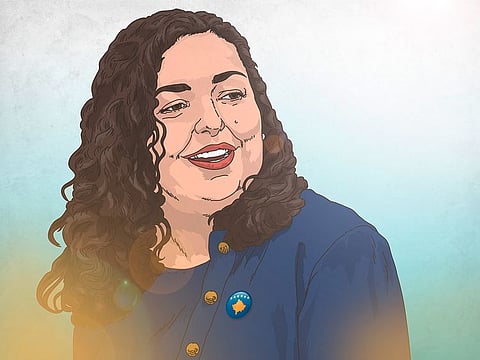Newsmaker: Vjosa Osmani - Stepping out onto the world stage
At 38, the new President of Kosovo is almost twice as old and the country she now leads

About three decades ago, one of the games desk editors at a Toronto tabloid newspaper used to play each night as they put out the next morning’s edition, was a pastime called “Nibs” — or News in Brief as readers would read.
To get a perfect score on Nibs, you had to assemble little news stories from around the world that occupied space down the sides of occasional pages. There had to be a stories from a Chinese fireworks factory, a Peruvian bus plunge, a ferry capsize from somewhere in Asia, and a breach of the ceasefire in the Balkans. Getting all four from the meant colleagues would buy you a beverage at the end of the night.
I thought about Nibs earlier this week — it is a long time, mercifully, since there was open conflict in the Balkans, that intertwined jigsaw of religions and ethnicities, historical rulers and competing interests where Europe begins to informally end and Asia begins to begin. The last time shots were fired in anger was over the carving out of Kosovo from Serbia in the dying months of the last century, and just over two decades have passed since the little nation was first staked out by the United Nations Security Council before declaring itself independent in 2008.
Yes, for an old continent, Europe still has a few issues to settle when it comes to marking out nations on its map. And like the majority of the 1.8 million who live in the little country — it is about one-eighth the size of the UAE — sandwiched between North Macedonia, Albania, Montenegro and Serbia, the new president, Vjosa Osmani, has lived through that process of nationhood. Perhaps the biggest challenge facing the 38-year-old leader will be to gain recognition from Serbia which, like Russia and China, refuse to acknowledge the reality of her nation’s very existence. Then again, in the European Union, Kosovo is not recognised either by Cyprus, Greece, Spain, Romania and Slovakia.
Osmani, a charismatic politician, reformer and lawyer, was elected president by the parliament in Pristina last Sunday with the backing of Prime Minister Albin Kurti and his Vetevendosje (Self-Determination) party. She received 71 votes from the 82 lawmakers present in the 120-seat parliament. While the role is largely ceremonial, she is now effectively the commander of the country’s armed forces and will also serve as one of the country’s top diplomatic representatives. But as with the creation of Kosovo itself, nothing is straightforward, and two opposition parties and the ethnic Serb minority party refused to take part in the vote.
Osmani started her carrier as a teenage activist. She studied law in Pristina and then completed her bachelor’s and master’s degrees at the University of Pittsburgh in the US. She was one of the senior officials of the Democratic League of Kosovo (DLK) party was ousted from the organisation following inter-party strife but remains an immensely popular figure. In February’s general election, she secured more than 300,000 votes as a Vetevendosje candidate. With the votes on one-fifth of the nation’s electorate, she is viewed as a role model for women in a region where patriarchal values hold sway. It seems surprising then that she is the new nation’s second female leader following Atifete Jahjaga, who served as president between 2011 and 2016.
Those patriarchal values are fast changing — more than half of the population of Kosovo are under 25 years of age and Osmani is a very relatable figure — and is determined to resume stalled talks with Serbia to normalise Kosovo’s status. The government in Belgrade still regards the nation as a breakaway province and rejects its 2008 declaration of independence. On Sunday, Osmani once again called for dialogue, but also called on Belgrade to apologise for the 1990s conflict and persecute war criminals.
“Peace would be achieved only when we see remorse and an apology from Serbia and when we see justice for those who have suffered from their crimes,” she said.
The position of president had been vacant since November after Hashim Thaci resigned after a war crimes indictment. Like most Kosovar politicians, Thaci built his reputation on his wartime record, fighting as a guerrilla commander against Serbian armed forces.
He was the political chief of the rebel Kosovo Liberation Army (KLA), an ethnic Albanian group. The charge sheet against him in The Hague includes murder, torture, illegal detention, enforced disappearances and persecution, all of which allegedly occurred under Thaci’s watch in 1998 and 1999. It was a nasty little war — are they ever any other way? — that claimed some 13,000 lives but only ended after a Nato bombing campaign on Serbia and UN intervention.
Thaci oversaw Kosovo’s unilateral declaration of independence 12 years ago before becoming its first prime minister. He was then elected president in February 2016, before assuming office two months later. Three others, as well as Thaci, have been charged with war crimes and crimes against humanity. The four are accused of “a widespread or systematic attack against the civilian population,” including those believed to be collaborating with Serb forces, or not cooperating with the KLA.
Now, Osmani faces the challenge of talking to Belgrade and trying to improve its economy, mired in problems and political divisions, with tensions occasionally flaring up with Belgrade. Both she and Kurti present themselves as part of the next generation of Kosovo politicians, professing more liberal values and pledging to tackle widespread corruption.
Vetevendosje won a large majority in February’s election, and Osmani’s elevation to the top office now offers the anti-establishment protest movement turned political party a chance to reform and shape the new nation. It campaigned on an anticorruption platform and accused traditional elites of squandering Kosovo’s first years of independence with graft and mismanagement.
More crucial is the fact that politicians in both Serbia and Kosovo have continually stoked the conflict as a way to maintain power. Now, with Osmani at the helm, there is an opportunity to break that cycle. Maybe the future does indeed seem brighter.
With inputs from agencies
Sign up for the Daily Briefing
Get the latest news and updates straight to your inbox








